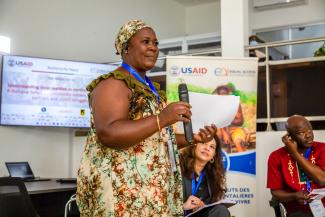Côte d’Ivoire is in a period of strong economic growth following nearly a decade of conflict but still faces political and post-conflict challenges around issues related to political consensus, reconciliation and security. In October 2020, Côte d’Ivoire is expected to hold pivotal presidential elections. A peaceful transfer of power from one elected president to another would be a first for the country. Government efforts to promote reconciliation have thus far not met citizen expectations. Many Ivoirians are unable to fully participate in democratic processes and institutions, and of those who participate, some do not believe their voices are heard. Women and youth, in particular, feel marginalized. Failure to adequately address post conflict grievances, including a growing political crisis and the need for post-conflict reconciliation, along with the fact that growth has not translated into improved living standards for most households means that a return to conflict is possible in the run-up to the critical 2020 presidential elections. In order to consolidate democracy, it is critical that the government improve the trust of its citizens.
The U.S. Agency for International Development (USAID) supports the Government of Côte d’Ivoire in the areas of Democracy, Human Rights, and Governance. USAID efforts focus on promoting transparent, credible elections; increasing participation of youth and women in the political process; and strengthening community resilience in marginalized areas, particularly unaddressed post-conflict grievances such as the spill-over from the regional conflict in Burkina Faso and Mali. Its $11.2 million Political Transition and Inclusion program, implemented through a consortium led by the National Democratic Institute (NDI) seeks to improve the Ivorian government’s inclusivity, responsiveness, and accountability to citizens’ needs and concerns. The goal is to increase citizen confidence in the state, particularly among youth and women, in order to establish lasting conditions for stability. Many Ivoirians have taken steps to strengthen inclusion and democratic processes as firewalls to further violence and instability.

Studio Wane for USAID
